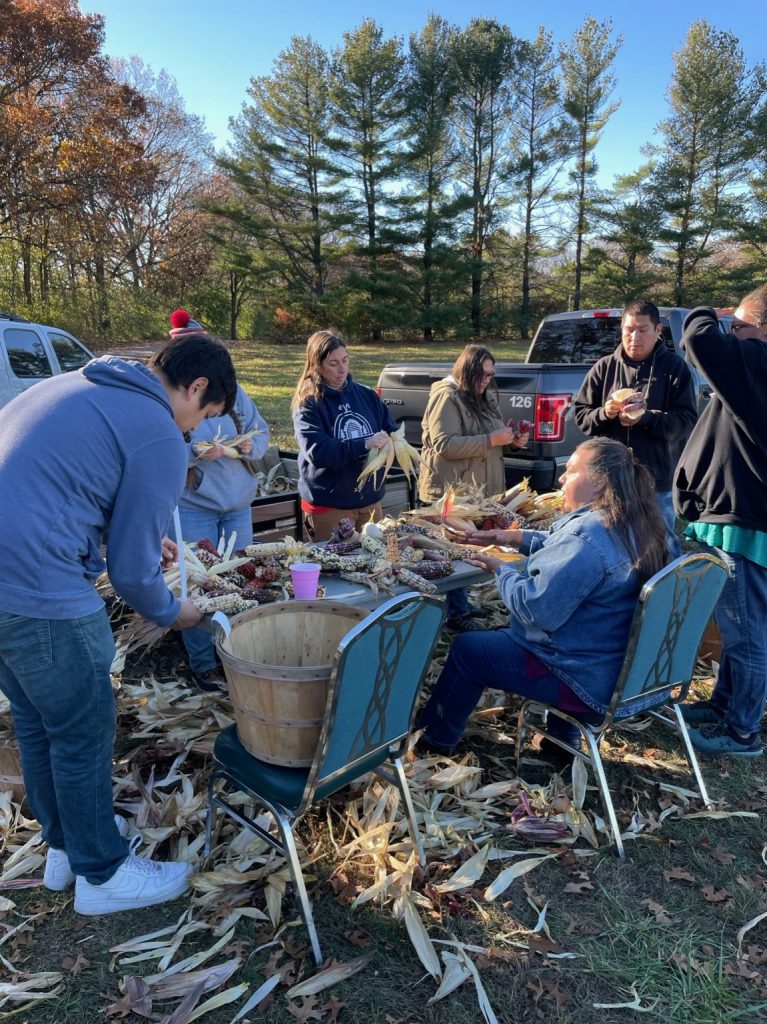Wisconsin’s 11 federally recognized Tribes have formally united in an unprecedented coalition to reclaim control of their food systems, advancing a collective vision for long-term food sovereignty. Also significant, they’ve enlisted UW–Madison as a strategic research and capacity-building partner.
Tribes in Wisconsin are collaborating to reestablish traditional food systems that have been lost over time. It’s a big undertaking. And it is particularly noteworthy that 11 Tribes in Wisconsin are coming together collectively to make this change.

“What is happening in Wisconsin in terms of intertribal collaboration is truly remarkable,” notes Dan Cornelius, Research and Outreach Program Manager with the UW Law School’s Great Lakes Indigenous Law Center and the College of Agricultural and Life Sciences, and an Oneida Tribal member. “Partners from multiple Tribes and Tribal organizations are coming together to strengthen our traditional food pathways. That is unique, and it wasn’t really happening before the Great Lakes Intertribal Food Coalition formed in 2021.”
The Great Lakes Intertribal Food Coalition (or GLIFC) manages the Tribal Elder Food Box Program, a program founded during the COVID-19 pandemic to provide healthy, culturally important food to Tribal communities. The program delivers over 30,000 boxes of nutritious, culturally meaningful foods annually for Tribal members over 55 years old in Wisconsin.
“GLIFC is the foundation for the UW–Madison Rural Partnership Institute’s Indigenous Food Systems project,” notes Cornelius, one of the project leads. “This project works hand-in-hand with GLIFC to scale and improve Indigenous corn production, provide critical education and outreach, and co-create research.”
Currently, there are not enough Tribal producers in the region to supply all of the food for the Tribal Elder Food Box Program. The Indigenous Food Systems Resilience project is helping to support new Tribal producers, helping existing producers scale up, and building capacity for producers of all sizes as well as Tribal agriculture departments.
A recently released report on the Indigenous Food Systems Resilience project outlines the key activities of the project to date, including co-organizing community events, hosting equipment demonstrations and safety trainings for Tribal producers, providing critical training in areas like agronomy and maple syrup production, and helping plant, harvest, and process corn and cover crops at the two Ho-Chunk training farms. According to Tricia Gorby, one of the project leads and Assistant Dean and Director of UW–Madison Extension’s Natural Resources Institute, these activities provided key opportunities to build lasting relationships. “We understand that when working with the Tribes in Wisconsin, it is critical to build trust, respect, and reciprocity. Those elements are essential before a collaborative project is even proposed. Going into relationships with trust and ensuring that each step of the way you are working to ensure Tribes have what they need to be successful in their efforts—that is key.”
This video highlights the partnerships between the UW-Madison Indigenous Food Systems Resilience Project Team and their Tribal partners, focusing on the Tribal partners’ perspective on ways to build reciprocal and respectful partnerships. The companion video, Supporting Capacity Building for Intertribal Food Sovereignty, shares additional information on the project.
The Indigenous Food Systems Resilience project team—which includes 9 Tribal partners and 14 UW–Madison units, including the Division of Extension and the College of Agricultural and Life Sciences—has taken great care to build long-lasting relationships with Tribal partners. They recently released two videos highlighting the process of building effective partnerships and how they are working with Tribes to build capacity around food sovereignty.
A key part of that is through research and funding. To date the project has provided over $140,000 in funding to the Wisconsin Tribal Conservation Advisory Council and the Menominee Tribal Department of Agriculture and Food Systems. They are also partnering with the Ohe·láku Corn Growers Cooperative in Oneida to research interseeding Tuscarora white corn with culturally important and medicinal plants and researching the toxicity and safety of restored wild rice in polluted waters in the St. Louis River Estuary.
“These research projects are Indigenous led—not the other way around,” notes Cornelius. “All of these actions add up when it comes to creating a process of intertribal collaboration. And it gives me great optimism to see UW–Madison as a true reciprocal partner in this work. Other states are looking to us as a model for how to do intertribal work in a meaningful way.”

